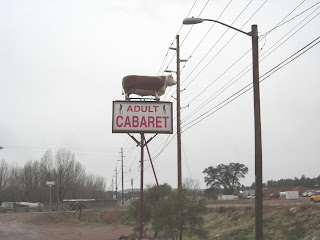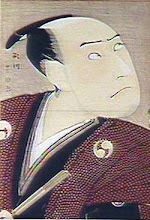Todai hospital also turned new mom away : National : DAILY YOMIURI ONLINE (The Daily Yomiuri)
I have always known that Japan was more hide bound about following the rules than the Chairwoman of a Methodist Church flower committee. Everyone in a school or corporation dresses alike, and they all change from winter uniforms to summer uniforms on the same day, and damn the weather. But this article about a woman dying because hospitals seemed to think that the number of beds their policy manual states they will have is more important than the number of people who are actually in critical need really takes the cake.
When a desperately ill person arrives at your emergency room, it's not something you can handle by using your best imitation of Eddie Izzard imitating James Mason while blocking the patients entrance. "Dreadfully sorry and all that, but you see we can only take nine patients, and I'm afraid we've reached our quota. Trauma surgeon's already complaining about having to work five and six hours at a stretch. But look, I'm not really supposed to tell you this but, just between you and me, Yamaguchi doesn't look good. If you can hang about for a few hours chances are an opening will appear. What do you have? Massive brain hemorrhage? That could be dicey. Yamaguchi's got a bum heart, and they never seem to move along when you need them to. Anyway, good luck.
What do these so called hospitals do when there is a train wreck or a building collapse? Hold a raffle? "Okay, there's fourteen of you in critical condition and twenty-three that are merely serious. Well, the staff took a vote and they decided they would take three criticals and four serious. So what we're going to do is give each of you one of these carnival tickets and put its mate in this bedpan here. Then we'll do a drawing. Remember! Just three critical and four serious. As for the rest of you, well, it is a lovely day."
Sorry about this, but I feel the need to shout. THESE ARE HOSPITALS DAMMIT!
They don't decide they'll do a spot of healing today, and then maybe take a long weekend. They take what comes to them. If they have nine beds for neonatal emergencies, and nature thoughtlessly presents them with a tenth—THEY TAKE IT. Bassinets are moved a bit, maybe a laundry cart is put in the hall. You make room. Then the staff figures out how to divide up the load. What you don't ever do. Never, ever do is condemn people to death just because it's inconvenient, doesn't follow the official guidelines, or you would have to go to all the bother of finding a space. You are in the business of saving lives. That's your priority. Only that.
So if the Second Assistant Floor Director comes around throwing a stink about how there seem to be ten beds here and the Guidelines clearly state the room was built for nine. Invite him to take it up with the third bridge from the North, and offer to write a press release clearly stating he was the person who decided the critically injured woman expecting her first child had to die because treating her would have clearly deviated from the Holy Official Guidelines, which seem to be more precious than any mere life
The Rest of the Story
24 October 2008
11 October 2008
I would like to apologize for my friend here . . .
Aside from the sister-in-law who lives in Michigan, it seems that the majority of the people wandering onto this blog are algebra students. At least I think they are algebra students. The reason I am not a retired architect instead of a retired bookseller is that my math abilities are comparable to my ability to fly. That is, largely a matter for my dreams. They could be physics or chemistry students for all I know, but the phrasing of their searches leads me to believe they are struggling with a math problem; and since algebra is the branch of mathematics I understand least, I assume that's the kind of math.
Anyway, these poor souls are doing Google searches for "missing factor" or some similar phrase, and Google obligingly directs them here. I imagine it can be quite frustrating to be desperately searching for the answer to a homework problem or help preparing for a test and suddenly find yourself looking at the ramblings of some old geezer.
For this I sincerely apologize. I hope the exam goes well, and that you do find an answer to your missing factor problem
If it is any help, the missing factor in my life has always been 9.
The Rest of the Story
Anyway, these poor souls are doing Google searches for "missing factor" or some similar phrase, and Google obligingly directs them here. I imagine it can be quite frustrating to be desperately searching for the answer to a homework problem or help preparing for a test and suddenly find yourself looking at the ramblings of some old geezer.
For this I sincerely apologize. I hope the exam goes well, and that you do find an answer to your missing factor problem
If it is any help, the missing factor in my life has always been 9.
The Rest of the Story
16 September 2008
Tan shoes and pink shoelaces . . .
When a person reaches my age it is not too unusual for them to start talking about how great things were in some semi-mythical period in the past. For me it would be the 1950s. There are, however, very few things I want to resurrect. Don't get me wrong, I have lots of great memories of my youth—like the magic of slow-dancing with a girl to "Harlem Nocturne"—it's just that I also remember the not so pleasant things. We may be going to hell in a hand basket now, but we were headed that way then too. The basket is just a different style now.
The Rest of the Story
The Rest of the Story
21 August 2008
First thing I remember . . .

I was born in 1946 in Hailey, Idaho. My memories of the event are fuzzy at best, but my parents told me it was in a clinic/hospital on the second floor of the Fox Building which also had the town's dry goods/general store. I believe Bruce Willis owns it now, but that has absolutely nothing to do with my story. The house my parents lived in at the time was a natural foods boutique when we were there in 1981, but that also has no bearing on anything unless, of course, you are in the market for some organic legumes.
The Rest of the Story
Labels:
bleeding,
hemophilia
02 August 2008
And then it begins . . .

I am old enough to remember the old non-disposable hypodermic needles. From my early childhood until right around eighth or ninth grade every time I had a serious hemorrhage one of my arms (usually the right because it had a huge vein the med students loved) would be strapped down to a board for the IV. The needles were quite large compared to those used today because they had to be strong enough to go through repeated cleanings, and they had absolutely no give to them so your arm, or whatever, had to be kept rigidly straight if the needle was anywhere near the wrist or elbow. When you coupled the thick metal with a large bore for blood you got a very thick needle with a fairly large bevel on the end.
And that was where the fun began.
The Rest of the Story
Labels:
hemophilia,
hospital
30 June 2008
Signs, signs, everywhere a sign . . .

Sometimes Arizona is a very strange place.
 Sink placement is always an adventure.
Sink placement is always an adventure.
 When I think of buying a new Lexus, I think giant sumo.
When I think of buying a new Lexus, I think giant sumo.
 Sink placement is always an adventure.
Sink placement is always an adventure. When I think of buying a new Lexus, I think giant sumo.
When I think of buying a new Lexus, I think giant sumo.The Rest of the Story
18 June 2008
Until they take it away . . .
A few years ago, which is old fart talk for ten or twelve, my wife got an assignment in New York for ten weeks. Unfortunately they didn't see the need to send me too, so I was left here to feed the cats. One Saturday after about four weeks I decided the apartment needed a really good cleaning. The plan was to clean everything, take a shower and reward myself with a really good lunch/dinner.
The Rest of the Story
The Rest of the Story
Labels:
bleeding,
hemophilia,
hospital
18 May 2008
To me he was . . .
I was talking to my mother on the phone tonight. After the usual questions about her current health and happiness she said:
 "You guys did have a busy life together." My father passed away in 2002 just three weeks before their 58th anniversary.
"You guys did have a busy life together." My father passed away in 2002 just three weeks before their 58th anniversary.
The Rest of the Story
I was thinking just the other day about all the things your father and I did in the 57 years we were together.
 "You guys did have a busy life together." My father passed away in 2002 just three weeks before their 58th anniversary.
"You guys did have a busy life together." My father passed away in 2002 just three weeks before their 58th anniversary.I was always so proud of him. No matter what, he made sure we paid our bills. Even the hospital bills for you and your brother.
The health insurance my dad got through his job was almost totally useless, and my parents paid almost all of our hospital bills themselves. "I know he worked hard, but what I remember most is that we always seemed to have fun."
He worked like a dog. But he never complained.
"No, he never did. And like I said, we always had fun."
Don't take money to have fun.
She was quiet for a couple seconds while we both remembered.
God, I miss him.
"Me too, Mom."
In a world that often treated my brother and me as something less than real men because we had hemophilia (and often didn't mind telling us quite bluntly), he never had anything but love and pride for us. When other fathers were abandoning their family or ignoring a son's existence because he was 'defective', my father was taking on another job so he could be sure we had the care we needed. When the world was telling my brother and me that we would never be anything but cripples and a drain on society, our father was teaching us how to work a short order grill, do rough carpentry, and run a bakery so we would always be able to make our own way.
In my last post I talked about how the gene for hemophilia can stay hidden for several generations. In our family it is just the opposite. My grandfather was a hemophiliac, two cousins, my brother and I, and now my grandson. I know my life has been infinitely easier than my grandfather's, and I am confident that my grandson's will be infinitely easier than mine. I just hope that he never has to hear some girl's father tell him not to come around anymore because Janice/Rosa/Sharon can't be wasting her time on a cripple; but if he does I hope he has someone like I did who will remind him that "your bleeds can be stopped, and you'll get better, but there isn't any cure for being a stupid jackass."
opposite. My grandfather was a hemophiliac, two cousins, my brother and I, and now my grandson. I know my life has been infinitely easier than my grandfather's, and I am confident that my grandson's will be infinitely easier than mine. I just hope that he never has to hear some girl's father tell him not to come around anymore because Janice/Rosa/Sharon can't be wasting her time on a cripple; but if he does I hope he has someone like I did who will remind him that "your bleeds can be stopped, and you'll get better, but there isn't any cure for being a stupid jackass."
 opposite. My grandfather was a hemophiliac, two cousins, my brother and I, and now my grandson. I know my life has been infinitely easier than my grandfather's, and I am confident that my grandson's will be infinitely easier than mine. I just hope that he never has to hear some girl's father tell him not to come around anymore because Janice/Rosa/Sharon can't be wasting her time on a cripple; but if he does I hope he has someone like I did who will remind him that "your bleeds can be stopped, and you'll get better, but there isn't any cure for being a stupid jackass."
opposite. My grandfather was a hemophiliac, two cousins, my brother and I, and now my grandson. I know my life has been infinitely easier than my grandfather's, and I am confident that my grandson's will be infinitely easier than mine. I just hope that he never has to hear some girl's father tell him not to come around anymore because Janice/Rosa/Sharon can't be wasting her time on a cripple; but if he does I hope he has someone like I did who will remind him that "your bleeds can be stopped, and you'll get better, but there isn't any cure for being a stupid jackass."父ありてあけぼの見たし青田原
With my father/I would watch the dawn/Over the green fields.
The Rest of the Story
Labels:
family,
hemophilia
The old, familiar sting . . .
Hemophilia can be a truly nefarious condition.
One of its more nefarious aspects is that it can lie low for generations, quietly getting passed from mother to daughter but not calling attention to itself by taking any side trips into the male branches of the family. (Yes, I know it's all governed by genetics and chance, and the condition does not, indeed cannot, take any active interest in how and when it manifests itself. It's just sometimes easier, for me at least, to talk about it this way.) The family goes along minding its own business, and with each generation one or two of the daughters are carriers, who grow up and have children and again the luck of the draw gives them a son who is not hemophiliac and a daughter who will quietly, secretly, unknowingly pass on the genes. Eventually so many generations pass that the family forgets about great-great-great-great grandfather Sheldon who was said to be a cripple and died young bleeding into his stomach.
The Rest of the Story
One of its more nefarious aspects is that it can lie low for generations, quietly getting passed from mother to daughter but not calling attention to itself by taking any side trips into the male branches of the family. (Yes, I know it's all governed by genetics and chance, and the condition does not, indeed cannot, take any active interest in how and when it manifests itself. It's just sometimes easier, for me at least, to talk about it this way.) The family goes along minding its own business, and with each generation one or two of the daughters are carriers, who grow up and have children and again the luck of the draw gives them a son who is not hemophiliac and a daughter who will quietly, secretly, unknowingly pass on the genes. Eventually so many generations pass that the family forgets about great-great-great-great grandfather Sheldon who was said to be a cripple and died young bleeding into his stomach.
Then it happens.
The Rest of the Story
Labels:
bleeding,
family,
hemophilia
09 January 2008
It seems like a mighty long time . . .
It was in 1965. I'm pretty sure it was on a Sunday morning, but I can't remember if it was in late April or early May. Early in the morning my mother dropped me off in the circle drive in front of the main entrance of the high school. She took my suitcase out of the trunk for me, and put it on the side walk next to those of my classmates. She asked me one last time if I was sure I would be all right, and then got back in the car and drove home.
The Rest of the Story
I stood there in the early chill with a couple of my buddies, and we tried to appear cool and nonchalant while I secretly wondered if the doors to the school were unlocked because I was so excited I was about to pee my pants. Most of the senior class of 1965 was there gathered into little clumps. We had spent the last couple years selling magazine subscriptions, washing cars and running the refreshment stand at football games to earn the money for this trip, and now it was actually happening.
The Rest of the Story
Labels:
1960s,
bleeding,
hemophilia,
music,
New York,
The New Yorker
Subscribe to:
Comments (Atom)









